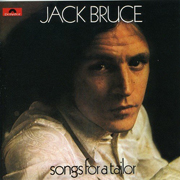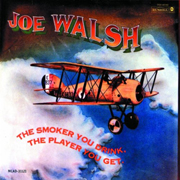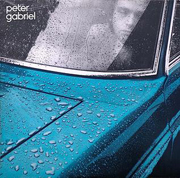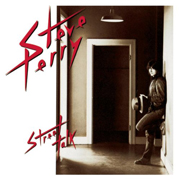Generally speaking, rock bands really don’t last very long without members leaving (or dying) mostly due to an inability to play nicely with others. (Although ZZ Top and U2 might tell you otherwise.) Living, working and traveling with a bunch of dudes is like being married to several others at the same time. Needless to say, whenever bands are involved, there are going to be issues that lead to breakups, firings and the like.
Sometimes, the people who quit (or are fired from) a band use that event as the inspiration for a new song. Today, we’re going to visit five of these departures, all of which have inspired a song based on the split.
Jack Bruce
“Theme For An Imaginary Western”
From Songs For a Tailor (1969)
Representative lyric:
“Oh the dancing and the singing
Oh the music when they played
Oh the fires that they started
Oh the girls with no regret”
 For a couple of years in the pre-Led Zeppelin late 1960s, no touring blues-based rock band was bigger than Cream. Labeled (perhaps unfairly, to their ultimate detriment) as the first “super group,” the trio of Eric Clapton, Jack Bruce and Ginger Baker were certainly a volatile combination. Actually, Bruce and Baker were the ones who couldn’t get along with each other, an issue that predated the band by several years, when both were unknowns in the thriving London jazz and blues scene.
For a couple of years in the pre-Led Zeppelin late 1960s, no touring blues-based rock band was bigger than Cream. Labeled (perhaps unfairly, to their ultimate detriment) as the first “super group,” the trio of Eric Clapton, Jack Bruce and Ginger Baker were certainly a volatile combination. Actually, Bruce and Baker were the ones who couldn’t get along with each other, an issue that predated the band by several years, when both were unknowns in the thriving London jazz and blues scene.
So in 1969, with the band now defunct, Bruce released his first solo album, Songs For a Tailor, which included his most famous song (outside of Cream), “Theme For An Imaginary Western.” The melancholy track was the fitting tribute for what happened next; the album peaked at #55 on the charts, while Clapton and Baker’s new band, Blind Faith, released an album (the only one, it turned out) that topped the charts for two weeks that September.
Trivia: “Theme” was covered by Mountain at the original Woodstock festival and was featured on their debut album the following year.
Joe Walsh and Barnstorm
“Rocky Mountain Way”
From The Smoker You Drink, The Player You Get (1973)
Representative lyric:
“And we don’t need the ladies
Crying ’cause the story’s sad, uh huh
Rocky Mountain Way
Is better than the way we had”
 Joe Walsh got his start with Cleveland-based James Gang, a power trio whose first three albums are considered classics by students of the genre. A few tracks, namely “Funk #49” and “Walk Away” are still classic rock radio staples (not to mention at Eagles concerts years later after Walsh replaced Bernie Leadon). Unhappy about having to shoulder the load of being the vocalist as well as sole guitarist (not to mention primary composer), Walsh quit the Gang and ended up in Colorado to ponder his next move.
Joe Walsh got his start with Cleveland-based James Gang, a power trio whose first three albums are considered classics by students of the genre. A few tracks, namely “Funk #49” and “Walk Away” are still classic rock radio staples (not to mention at Eagles concerts years later after Walsh replaced Bernie Leadon). Unhappy about having to shoulder the load of being the vocalist as well as sole guitarist (not to mention primary composer), Walsh quit the Gang and ended up in Colorado to ponder his next move.
Starting fresh with a new band named “Barnstorm,” Walsh wrote “Rocky Mountain Way” about the freedom he felt not being constrained by the limitations of his old band. Unfortunately, he eventually felt victim to the strain of being “on his own,” so when the Eagles offered him a place in the band two years later, he happily accepted.
Trivia: “Rocky Mountain Way” was the first hit featuring the “talk box,” a device later made famous by Peter Frampton and Bon Jovi, among others.
Peter Gabriel
“Solsbury Hill”
From Peter Gabriel (1977)
Representative lyric:
“So I went from day to day
Though my life was in a rut
Till I thought of what I’d say
And which connection I should cut”
 Genesis, in its original incarnation, was a cult band. A large one. Toe tappers like “The Return of the Giant Hogweed,” “The Battle of Epping Forrest” and the epic 23-minute “Supper’s Ready” all but guaranteed that they weren’t played with any regularity on rock radio; the band made mark on stage. Which meant life in the band was a Groundhog Day of writing, recording, rehearsing and touring. Vocalist Peter Gabriel was the face (and figurehead) of Genesis for the first half of the 1970s, and midway through the decade when he needed to call time for family health purposes, it looked like it was all over for the prog band.
Genesis, in its original incarnation, was a cult band. A large one. Toe tappers like “The Return of the Giant Hogweed,” “The Battle of Epping Forrest” and the epic 23-minute “Supper’s Ready” all but guaranteed that they weren’t played with any regularity on rock radio; the band made mark on stage. Which meant life in the band was a Groundhog Day of writing, recording, rehearsing and touring. Vocalist Peter Gabriel was the face (and figurehead) of Genesis for the first half of the 1970s, and midway through the decade when he needed to call time for family health purposes, it looked like it was all over for the prog band.
While no ill will occurred between the members during the transition, when Gabriel stepped away from the band, and in true musical chairs fashion drummer Phil Collins stepped up the microphone and the show went on. Both acts – the Collins-fronted Genesis as well as solo Gabriel quickly eclipsed the success of the original band in terms of sales as well as airplay. Peter Gabriel’s first album, released two years after his exit, contained “Solsbury Hill,” featuring (mostly) an unusual 7/4 time signature, was his musical account of walking away from Genesis. No word came from his former bandmates, at least until Phil Collin’s memoir was released in late 2016.
Trivia: Peter Gabriel’s first three albums were all titled “Peter Gabriel.” Fans have differentiated them by nicknames; “Car,” “Scratch” and “Melt” due to the artwork.
Tommy Shaw
“Lonely School”
From Girls With Guns (1984)
Representative lyric:
“I’ve changed so many of my ways
I left the band, steadied my hand, learned a trade”
 In the late 1970s, it was hard to find a band larger (or more popular) than Styx. After slugging it out for over a decade, the Chicago-based outfit finally hit the big time with The Grand Illusion in 1977. Illusion and the three albums that followed (Pieces of Eight, Cornerstone and Paradise Theatre) each sold more than three million albums, being the first band to achieve this sales figure consistently. But in 1983, leader Dennis DeYoung’s dramatic concept album conceit, Kilroy Was Here alienated the fans and created resentment from other members, notably guitarist Tommy Shaw.
In the late 1970s, it was hard to find a band larger (or more popular) than Styx. After slugging it out for over a decade, the Chicago-based outfit finally hit the big time with The Grand Illusion in 1977. Illusion and the three albums that followed (Pieces of Eight, Cornerstone and Paradise Theatre) each sold more than three million albums, being the first band to achieve this sales figure consistently. But in 1983, leader Dennis DeYoung’s dramatic concept album conceit, Kilroy Was Here alienated the fans and created resentment from other members, notably guitarist Tommy Shaw.
At one point during the Kilroy tour cycle, Shaw was said to have “hurt his hand on a hotel room window, resulting in the postponement or cancellation of several shows. (Note to any budding publicists reading this: No rock star has EVER hurt his hand on a hotel room window. Just tell the truth – he was increasingly unhappy and drowned his sorrows with copious amounts of booze and blow, and locked himself in his hotel room, only allowing in his pusher, room service and selected groupies to enter.) Anyway – on his second solo single after leaving Styx, Shaw told the musical story of his frame of mind after his departure. Although Girls With Guns with a moderate success, all of Shaw’s subsequent solo releases went nowhere.
Trivia: After the failure of his third solo album, Shaw bounced back with the 1990 super group Damn Yankees, featuring Ted Nugent, Jack Blades and Michael Cartellone.
Steve Perry
“Running Alone”
From Street Talk (1984)
Representative lyric:
“Everyone’s a hero, if you want to be
Everyone’s a prisoner, holding their own key
Every step I take, every move I make
Always one step closer, I don’t mind running alone”
 Like Styx, Journey was a hugely popular act in the late 1970s into the mid 1980s, with hit singles, platinum albums and huge concert tours. Despite outward appearances, by the end of 1983’s Frontiers tour, the core of Journey was rotten. How much of that was due to vocalist Steve Perry – a singer with the reputation of being difficult to deal with (to put it mildly) – is unclear, but for all intents and purposes the band had splintered by that time. So Perry, unsure whether to continue on with Journey or go solo, asked his mother, Mary Perry for council. (She’s “Mary” who is referenced in the song.)
Like Styx, Journey was a hugely popular act in the late 1970s into the mid 1980s, with hit singles, platinum albums and huge concert tours. Despite outward appearances, by the end of 1983’s Frontiers tour, the core of Journey was rotten. How much of that was due to vocalist Steve Perry – a singer with the reputation of being difficult to deal with (to put it mildly) – is unclear, but for all intents and purposes the band had splintered by that time. So Perry, unsure whether to continue on with Journey or go solo, asked his mother, Mary Perry for council. (She’s “Mary” who is referenced in the song.)
So, Perry went ahead and released his hugely successful Street Talk album (remember “Oh Sherrie?”), and mom, not wanting to steer her darling boy wrong, advised him to return to the band that made him famous. Perry did so, but took dictator-like control of the next album, Raised on Radio, and kicked out long-time drummer Steve Smith and founding member, bassist Ross Valory in the process. Radio proved to the swan song for the band; Perry walked away at the end of the tour in early 1987. He released a second solo album in 1994 and even reformed Journey in 1996 for a new album, but in a déjà vu moment, he walked away, leaving the group in limbo once again. Little has been heard from him in subsequent years; he has truly become the Howard Hughes of the classic rock era.
Trivia: Journey’s “Don’t Stop Belivin’” is the largest-selling digital single from the pre-digital music era.